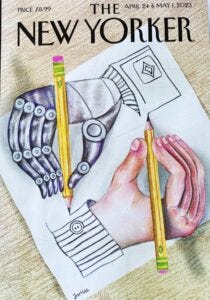Thursday 27 April, 2023
AI as ‘augmentation’
Current New Yorker cover. Nice illustration for a moment when people are wondering whether digital technology provides augmentation of human capabilities, or a replacement for them.
Quote of the Day
”The easiest way to mismanage a technology is to misunderstand it.”
Jaron Lanier, writing in the New Yorker.
Musical alternative to the morning’s radio news
Harry Belafonte | Day-O (The Banana Boat Song) (Live)
He died on Tuesday at the age of 96. The NYT has a nice obituary of him.
At a time when segregation was still widespread and Black faces were still a rarity on screens large and small, Mr. Belafonte’s ascent to the upper echelon of show business was historic. He was not the first Black entertainer to transcend racial boundaries; Louis Armstrong, Ella Fitzgerald and others had achieved stardom before him. But none had made as much of a splash as he did, and for a while no one in music, Black or white, was bigger.
Born in Harlem to West Indian immigrants, he almost single-handedly ignited a craze for Caribbean music with hit records like “Day-O (The Banana Boat Song)” and “Jamaica Farewell.” His album “Calypso,” which included both those songs, reached the top of the Billboard album chart shortly after its release in 1956 and stayed there for 31 weeks. Coming just before the breakthrough of Elvis Presley, it was said to be the first album by a single artist to sell more than a million copies.
May he rest in peace.
Long Read of the Day
Large Language Models as a Cultural Technology
Not a long read today but a long-ish (15-minute) listen because I don’t have a transcript for Alison Gopnik’s strikingly original view about what LLMs (Large Language Models) are, really. She argues that instead of regarding them as quasi-intelligent agents we should think of them as cultural transmission technologies, by which accumulated information from other humans is passed on in a compact form. This is, IMO, an original and interesting take on the phenomenon from a remarkable thinker who, among other things, changed the way I thought about how young children learn.
My commonplace booklet
Parrots taught to video call each other become less lonely
From The Guardian.
An American study got owners to train their pets to contact other birds using a touchscreen tablet.
The study, which involved giving the birds a tablet that they could use to make video calls, found that they began to engage in more social behaviour including preening, singing and play. The birds were given a choice of which “friend” to call on a touchscreen tablet and the study revealed that the parrots that called other birds most often were the most popular choices.
Doesn’t work with cats, alas.



